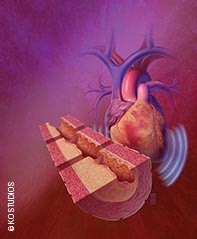Peer Reviewed
Feature Article Cardiovascular medicine
Acute coronary syndromes: management in 2010
Abstract
The initial management of acute coronary syndromes is a vital part of care. Early appropriate anticoagulation and consideration of timely transfer to a centre that has facilities for coronary angiography and percutaneous coronary intervention have become best practice.
Key Points
- Unstable angina, non-ST-elevation myocardial infarction (NSTEMI) and ST-elevation myocardial infarction (STEMI) are part of the continuum of acute coronary syndromes.
- All patients presenting with an acute coronary syndrome should chew aspirin (300 mg, uncoated tablets) as soon as possible after the onset of symptoms unless this is absolutely contraindicated. Clopidogrel is an alternative when patients are intolerant of aspirin.
- The current guidelines for the management of acute coronary syndromes conclude that anticoagulant therapy should be added to antiplatelet therapy.
- Following successful percutaneous intervention (PCI), the patient should be maintained indefinitely on low-dose aspirin with additional clopidogrel for at least one month (at least 12 months if a drug eluting stent is inserted).
- Coronary artery bypass grafting is usually preferred for the treatment of patients with left main coronary artery or triple vessel disease, or double vessel disease involving the left anterior descending coronary artery in patients with left ventricular dysfunction or diabetes.
- Patients with STEMI presenting to a hospital without PCI capability (and who cannot be transferred to a PCI centre and undergo PCI within 90 minutes of first medical contact) should be treated with fibrinolysis within 30 minutes of hospital presentation (assuming there are no contraindications).
Purchase the PDF version of this article
Already a subscriber? Login here.

